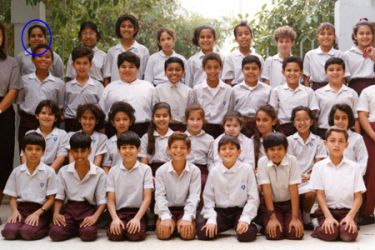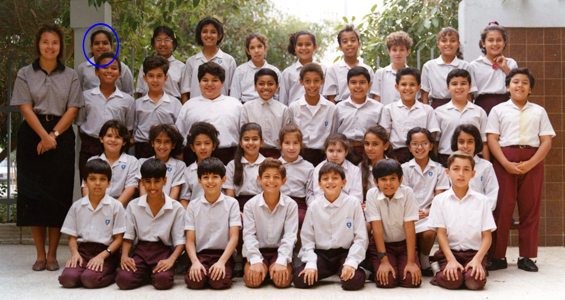
Nouf: ‘We saw a hurt Kuwait’
Nouf says the invasion changed her from a child to an adult.
 |
On August 2, 1990, the Iraqi army invaded the small emirate of Kuwait, which Saddam Hussein, Iraq’s president, had declared his 19th province.
The Gulf war lasted a little over six months yet the memory of the conflict remains strong, not least in the minds of the children of that war.
At the end of the school year of 1990, students at an international school in Kuwait said their final farewells as they headed off for the summer holidays.
Twenty years on, Al Jazeera follows a group of classmates who were separated during the war as they organise a reunion and try to find out what happened to their classmates and their school during and after the war.
Al Jazeera’s Nashwa Nasreldin was one of those students. She spoke to one of her former classmates Nouf, a Kuwaiti national and member of the royal family, who was in the UK on holiday when she heard the news that Kuwait had been invaded.
Nouf and her family watched the unfolding events from the UK, returning to Kuwait when the occupation ended. She has lived in Kuwait ever since and is married with three children.
Al Jazeera: How do you remember August 2, 1990?
Nouf: On August 2, I woke up really early in the morning because there was a lot of noise in the house.
I rushed to the living room. Usually as it’s a holiday everyone in the house would sleep in. But the living room was full with family members. I was like: ‘What’s going on?’ They said Kuwait was gone. I asked: ‘How can my country, how can a country be gone?’ No one had an answer.
And it’s really sad because as a child you can actually sense the fear and insecurity in your parents and now I understand, as a parent, what they’ve been through.
Did you wonder about the school at all, or your school friends?
I thought everything would be normal soon and we’d go back to Kuwait and see all my friends again in Kuwait but then September was almost over and my parents decided we had to go to school in the UK.
King Fahad Academy in the UK was very nice and they let all the Kuwaitis in the UK attend it.
We went there up until December and the school started getting threats from the Iraqi regime because it was concentrated with a lot of Kuwaiti students to the point where there were helicopters circulating all the way at the top and security all around the school and every couple of days they would get a bomb threat and they’d evacuate the school so my father thought it wasn’t worth it and we withdrew.
So you just stayed at home?
We stayed at home. It wasn’t fun at all. We spent the days waking up to the news, sleeping on the news. Just waiting to hear the good news. Waiting to get in touch with family members who were inside [Kuwait]. Hearing some rumours here and there, not knowing [what] was true.
Did you miss school at all?
Shockingly yes, I did miss school.
What things do you remember from the news?
We’d hear a lot about the Kuwaiti resistance which played a huge role helping the Kuwaitis in Kuwait – delivering food and money and fighting the Iraqis and protecting homes. They played a huge role.
We’d also get pictures sent to us in the UK and all over the world of Kuwaitis tortured by the Iraqis – men, women, kids. It was really sad.
Do you remember what was happening in the UK?
Yes there were a lot of Kuwaitis in the UK at the time and there were organised peaceful demonstrations going on throughout the invasion and I’d take part in every single one of them, actually waiting for them.
There was a lot happening and luckily I was in a place, in a country that was on our side.
Everyone took part in making leaflets, T-shirts, banners in the demonstrations. We made sure we sent the message through: ‘We’re Kuwaitis and we want our country back. We stand by our leadership and no one can every change that.’
We’d walk from the Kuwaiti embassy I remember sometimes, all the way, it was in Queensgate I remember. All around Hyde Park, Speaker’s Corner and back.
Tell me about liberation, what was it like?
I can’t explain, I can’t describe the happiness after the liberation. Pure, pure, pure happiness. Your country’s back; your life’s back. Even as a child you can sense the insecurity. We were lost.
Luckily our government abroad helped Kuwaitis in every way. Financially, education, health, everything was taken care of. His highness Sheikh Jaber Al Ahmad, the Emir at the time, was actually the first who ever thought of sovereign wealthfare.
Since 1950 he was minister of finance at the time and luckily it was Kuwaiti investments which helped continue the fight for Kuwait and helped us live.
Do you think the war left a mark on the country?
I’m sure it did. If you got one positive thing out of the war it would be that Kuwaitis have always been united but they’re more united now.
What was it like to go back to Kuwait?
I remember Kuwait was liberated on February 26 and we just couldn’t wait to get back but of course for security reasons no one was allowed in the country directly after.
So it wasn’t until mid-March only my father was allowed in and he went, saw the house. Everything was damaged, everything was gone but we didn’t care, our country was back.
So he stayed there, fixed everything, set everything up for us and by the end of July we went back to Kuwait. We drove all the way from Dubai to Kuwait by car and just at the border entering Kuwait the joy, the happiness, I just can’t explain it.
I just couldn’t wait to get out of the car and run around. But of course because of all the mines left after it was dangerous so we couldn’t get out of the car till we reached home.
Entering the house it was different, because everything had been damaged and stolen. It looked like a different house to me. There were some parts of the house that my father left as they were so we could remember and there were writings on the wall saying things about Saddam and damaged areas which my father left untouched.
What were you most looking forward to?
It wasn’t my home specifically that I was looking forward to it was just Kuwait. I just wanted to see Kuwait.
It was really dark because just before the Iraqis were kicked out they burnt all the oil wells so there was a huge black cloud over Kuwait. And we sensed a different Kuwait. A hurt Kuwait.
What had changed in Kuwait?
The ratio of Kuwaitis definitely has changed in private schools after the invasion.
Public schools in Kuwait mainly concentrated on Arabic and after the invasion the Kuwaitis had a vision to educate their kids better in English because we never know what will happen.
We have a neighbour we can’t trust and we can’t change that neighbour obviously. Yes, definitely there were more Kuwaitis in private schools after the invasion.
How did it feel for you going back to school after the long break?
It was like going to a new school, having to make new friends, having to start over.
Is the memory of the war very much in the minds of the Kuwaitis or would they rather forget about it?
Kuwaitis will never forget this war. We’ll never forget the invasion and the impact it has left on our lives. Of course we have to move on but for us to completely forget, never. I’ll never forget and I’ll make sure my kids never forget.
Now looking back, just personally, do you think the war changed your life?
It was a timeline in my life where I grew from a child to an adult. I used to be a child before the invasion. My interests were toys, having fun and enjoying.
But after the invasion it was completely different. My interests have changed. Life was more serious after. You’d always think of the consequences of what would happen.
You asked me before if I had any pictures from before the invasion, but actually my life was erased. Everything was stolen, everything was taken. Really nothing was left. We had to start over.
How does that make you feel?
Of course I think about it like why don’t I have that, no memories but then on the other hand I’m glad we’re safe. You think about all sides of it.